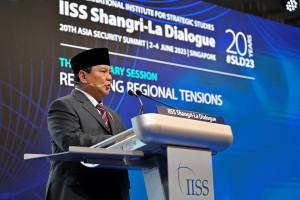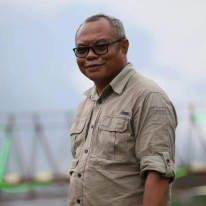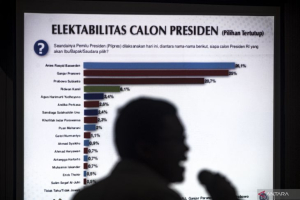Controversy surrounds Defense Minister Prabowo’s peace plan for the Russia-Ukraine conflict
The recent peace proposal put forth by Indonesia's Defense Minister, Prabowo Subianto, regarding the resolution of the ongoing Russia-Ukraine conflict has sparked intense debate and controversy.
The resolution, which involves the establishment of a demilitarized zone (DMZ) and a referendum, is not considered the official stance of the Indonesian government. President Jokowi also stated that Prabowo's peace plan was a personal initiative.
As known, Prabowo presented his peace plan during a speech at the Shangri-La Dialogue in Singapore on (3/6).
It includes a ceasefire and the formation of a demilitarized zone and urges both Russia and Ukraine to withdraw their forces 15 kilometers from their respective front lines. The plan also suggests holding a referendum organized by the United Nations to determine the aspirations of the population in the disputed areas identified by Prabowo.
Ukraine’s rejection of Prabowo’s peace proposal
At the same event, Ukraine's Defense Minister, Oleksii Reznikov, outright rejected Prabowo's proposed peace proposal, stating, "It sounds like a Russian plan, not an Indonesian one. We don't need a mediator coming up with such strange proposals,".
Reuters reported that Oleg Nikolenko, the spokesperson for the Ukrainian Ministry of Foreign Affairs, also rejected Prabowo's conflict resolution proposal. Nikolenko emphasized that Ukraine wanted Russia to withdraw its troops from the country.
The Ukrainian diplomat also urged Indonesia to support the peace proposal containing ten points put forward by their President, Volodymyr Zelensky. In addition to pushing for the withdrawal of Russian forces, the proposal also seeks justice by establishing a special court to prosecute war crimes committed by Russia.
The European Union (EU) representative Josep Borell Fontelles stated that if countries stopped providing military support to Ukraine, the war would end quickly. However, he warned that Ukraine's sovereignty would fall into the hands of Russia. "We cannot stop supporting Ukraine militarily because we don't want peace to come from surrender," Fontelles said during the same panel alongside Prabowo, as quoted by Reuters.
Indonesian Foreign Minister response regarding Prabowo’s peace proposal
Just two days after Prabowo's speech, Indonesian Foreign Affairs Minister, Retno Marsudi, conveyed the government's official position on the Russia-Ukraine conflict "The position of the Indonesian government remains unchanged," Retno said on Monday (5/6).
Firstly, the government always respects the sovereignty and territorial integrity of a country. This stance is reflected primarily in voting for resolutions concerning these issues at the United Nations General Assembly (UNGA).
Secondly, the government encourages Russia and Ukraine to cease the war. Retno stated that Indonesia conveyed this encouragement through President Joko Widodo's visits to Kyiv, Ukraine, in June 2022 and Moscow, Russia, in July 2022.
For instance, during the Group of Seven (G7) meeting in Japan in May 2023, President Jokowi expressed to President Zelensky that Indonesia continues to support peace efforts and is ready to serve as a bridge between Russia and Ukraine.
Thirdly, the government aims to ensure that the food supply chain remains uninterrupted. This aligns with the influence of Russia and Ukraine as major wheat exporters in the world. According to the Central Statistics Agency (BPS), Ukraine was the second-largest source of wheat imports in 2021.
Fourthly, the government advocates for the extension of this third initiative to last more than 60 days. The two-month extension, ending in July 2023, carries "considerable uncertainty." The senior Indonesian diplomat added that the government also provides humanitarian assistance to Ukraine. For example, Indonesia is committed to contributing to the improvement of a hospital in the Ukraine.
"So, these four points constitute the basic position of the Indonesian government," Retno concluded.
Indonesia's Need for Restraint in the Russia-Ukraine Conflict
Riza Arfani, a lecturer at Gadjah Mada University (UGM), believes that Indonesia needs to exercise restraint in the Russia-Ukraine war due to its position as a middle power. Additionally, the country does not have a direct interest in the conflict.
On the other hand, many countries have secured their food supplies amid the year-long war. "There is no strong pressure, both domestically and internationally, for us to play a more active role, unless we have a direct interest as we did last year when we hosted the G20 Summit," Riza said on Friday (9/6).
Riza added that Retno needs to find the appropriate forum to initiate recovery or damage control due to Prabowo's proposal to resolve the conflict. The government needs to assure the United States and other allied countries that Indonesia's position remains the same.
Meanwhile, Nicky Fahrizal from the Centre for Strategic and International Studies (CSIS) stated that Indonesia's reputation and position will remain intact if Jokowi and Retno can overcome the "blunder" from Prabowo.
As part of the government, Prabowo should not have proposed a peace plan without consulting the Ministry of Foreign Affairs and President Jokowi.
"There seems to be a lack of coordination between him, the Ministry of Foreign Affairs, and the President. He appears to be acting on his own," Nicky said.
Already have an account? Sign In
-
Start reading
Freemium
-
Monthly Subscription
20% OFF$29.75
$37.19/MonthCancel anytime
This offer is open to all new subscribers!
Subscribe now -
Yearly Subscription
33% OFF$228.13
$340.5/YearCancel anytime
This offer is open to all new subscribers!
Subscribe now







